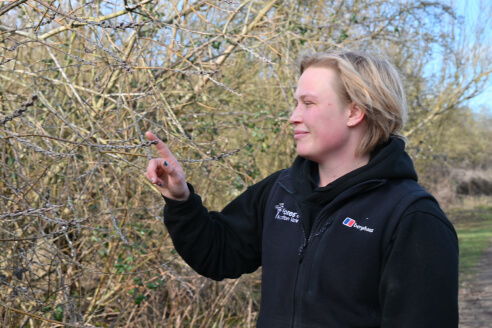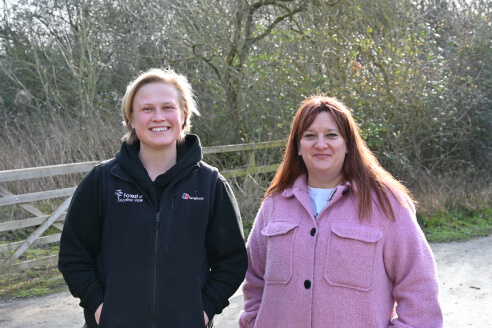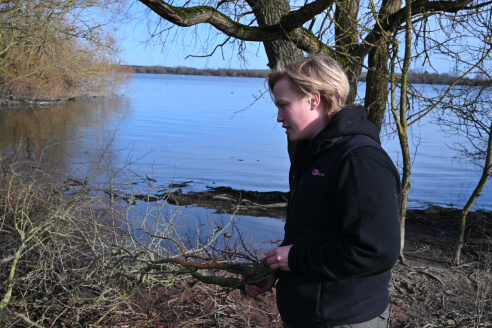The journey of Antonia Illingworth as a trainee forester in Forest of Marston Vale
31/03/2025
Can you tell us a little about your background and what inspired you to pursue a career in forestry and conservation?
I have always loved being outdoors. During my school holidays, I gained work experience in farming, finding lots of satisfaction in a hard day's work. I went on to read Zoology at the University of Glasgow, which was a great experience. My degree gave me a great foundation of scientific knowledge about ecology and ecosystems. I knew I needed an opportunity to continue gaining certification in specialist skills. I knew the Forest of Marston Vale Trust team would offer a great environment in which to learn and work. I was very excited to be offered and accept the role - the experience has been varied and rewarding. Forestry is a great conservation area, and I'm excited to build skills in this traineeship that will stand me in good stead when making future applications.
What have been some of the most exciting aspects of the role so far?
The role has been very exciting so far! I think a great part of it is getting involved with many different things. I have had placements with the rangers - learning how to traditionally hedge lay with billhooks and axes, leading volunteer tasks on tree-guard removal and scrub clearance and getting to put my chainsaw skills into practice. I've also been on a hedgerow planting team and learnt fencing techniques. I wrote my first Woodlands Management Plan, learning new mapping skills using QGIS (a computer program). I love working on a dedicated team - being able to ask lots of questions and feed my curiosity - there's always something new to learn, which I enjoy.



What skills have you developed since starting, and which ones are you most excited to keep building?
As a Trainee Forester, I am learning how important it is to have a forward-thinking perspective. When writing woodland management Plans, for example, looking at least 10 years into the future is necessary. You have to think about any operations' short- and long-term impacts. What trees will grow best where? What will the woodland look like in different seasons? What should be cut down to offer more light to the woodland floor? A woodland is a whole living thing, constantly changing, and I'm excited to keep developing my understanding of this.
There will also be many practical skills for me to work on - I hope to gain a tractor- driving qualification, for example. Getting to use my chainsaw ticket in practice is also very rewarding. When I passed my test, the instructor explained that it was like driving a car - "You've passed the exam, now you learn to drive". It's great to watch and learn from more experienced colleagues. I've enjoyed using my outreach skills in other roles and am excited to keep building them in my work at the Forest of Marston Vale Trust.
How has this experience deepened your appreciation for nature and conservation?
Widening my experiences, from farming river conservation to now into forestry, has helped me deepen my connection with nature. I have always loved practical learning, exploring new ideas and the outdoors. This traineeship is a great opportunity to ask questions and collect new facts and skills. For example, planting hedgerows recently, I learnt how to identify skylarks - they were diving about over the field we were working in. On each of my placements, I meet people who have built long careers in environmental stewardship - they always have great experiences and stories to share - I'm excited to become more rooted in my conservation career - so eventually, I'll be able to share my knowledge similarly. Outside of work, I enjoy writing - often with a big influence from nature - so my traineeship is also helping me connect with nature on a personal level. The more I get out and about, the better!
What does a typical day look like for you in the traineeship?
There isn't a typical day! - which is exactly what I enjoy. My day normally starts in the office, where I catch up on admin and other desk-based tasks, like mapping and writing risk assessments. Then I go out on to practical tasks - which are different every day - but might include, for example, chainsawing, site assessments and leading volunteer tasks.
How will this traineeship shape your future career in forestry and conservation?
This traineeship will provide me with plenty of great skills to support my applications to future roles in forestry and conservation. I am also building my professional network by learning from others about which skills are most important to develop to make me a great candidate.
Would you recommend this traineeship to someone, and what advice would you give someone considering applying for this traineeship?
I would recommend this traineeship to others. The Forest of Marston Vale Trust is a great workplace with a supportive team and learning environment. One of the most important things to support a successful application would be evidenced enthusiasm. I think I was helped by having a range of appropriate experiences - and being excited to gain more.
How can local communities get involved in supporting conservation and woodland restoration?
Local communities can support conservation and woodland restoration in all sorts of ways! One might be volunteering, which can be done with practical outdoor tasks like scrub clearance, tree guard removal, or even more specialist tasks like bird or butterfly species monitoring. Conservation charities also need many other useful skills. For example, at the Forest Centre, we have volunteers who work in reception. I've also had the opportunity to get involved with corporate tree planting - businesses work with the Forest to plant trees, getting a great day out for team building while supporting conservation efforts. More generally, it's all about caring for public and private natural spaces. If people have gardens, they can plant pollinator- friendly flowers, for example, or even make a small wildlife pond. In public spaces, always try to leave the space as you would want someone else to find it - putting all your litter in the bin, for example. It's great when people enjoy the spaces available while doing what they can to improve opportunities for nature to thrive. Overall, I'd say to be curious and get involved with whatever you can - caring for nature is great for your physical and mental health.
If you could change one thing about how people view forests and conservation, what would it be?
Something that surprised me when I started this traineeship was learning about how woodlands need to be continually managed through operations - for example, being thinned to create more space for light and plants on the forest floor. I understood the principle of a great habitat is one with lots of variation, where there are many available niches for living things to occupy. It increases the opportunity for biodiversity. I had never really thought about how this would be practically achieved - it's as important to plant lots of new trees as it is to care for woodlands long term - and this often involves cutting trees down to make space. So, one big message is to view woodlands as places we continually care for, with a forward-thinking perspective - creating well-structured habitats for diverse flora and fauna.
